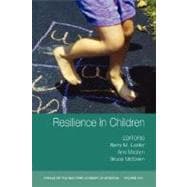
Note: Supplemental materials are not guaranteed with Rental or Used book purchases.
Purchase Benefits
What is included with this book?
Barry M. Lester, Ph.D., is Professor of Psychiatry and Human Behavior and Professor of Pediatrics at the Warren Alpert Medical School of Brown University. Dr. Lester founded and serves as Director of the Center for the Study of Children at Risk at Brown Alpert Medical School and Women and Infants Hospital of Rhode Island. Dr. Lester has been a member of NIH study sections and of the National Advisory Council on Drug Abuse at NIDA. He is past president of the International Association for Infant Mental Health and the author of more than 200 scientific publications and 16 books.
| Why Resilience? | |
| Overview: Barry M. Lester | |
| Keynote Address: Implications of resilience concepts for scientific understanding: Sir Michael Rutter | |
| Behavioral and Psychosocial Processes - Child Factors | |
| Competence and Resilience in Development | |
| Contributions of Temperament to Buffering and Sensitization Processes in Children's Development | |
| Resilience as an Attribute of the Developmental System: Comments on the Papers of Professors Masten and Wachs | |
| Behavioral and Psychosocial Processes - Family, Relationship and Broader Environmental Factors | |
| Risk, Resiliency, and Gene-Environment Interactions in Rhesus Monkeys | |
| Social Class and Race Disparities in School Readiness: How Can We Close the Gap. | |
| Response | |
| Issues | |
| Conceptual Issues in Studies of Resilience: Past, present, and future research | |
| Biopsychosocial Influences on the Development of Resilience | |
| Response: To be announced | |
| Behavioral and Psychosocial Processes - Prevention | |
| Adolescents' Resilience as a Self-regulatory Process: Promising Themes for Linking Intervention with Developmental Science | |
| Promoting Resilience Children and Youth: Preventive Interventions and Their Interface with Neuroscience | |
| Prevention Approaches to Enhance Resilience among High-risk Youth | |
| Neurobiological Processes - Emotion Regulation | |
| Behavioral Differences in Aggressive Children Linked with Neural Mechanisms of Emotion Regulation | |
| Discussion of Marc D. Lewis Presentation "Behavioral Differences in Aggressive Children Linked with Neural Mechanisms with Developmental Science" and Michael Davis Presentation "The Role of Opiate Receptors in the Medial Nucleus of the Amygdala (Mea) in Conditioned Fear Measured with Fear Potentiated Startle" | |
| Neurobiological Processes - Genetics | |
| Genetic and Environmental Influences on the Development of Alcoholism: Resilience Versus Risk | |
| Response: Kathleen Ries Merikangas | |
| Neurobiological Processes - Neuroendocrine | |
| Stress and the Adolescent Brain | |
| Effects of a Therapeutic Intervention for Foster Children on Behavior Problems, Caregiver Attachment, and Stress Regulatory Neural Systems | |
| Response | |
| Neuroscience and Intervention | |
| Prevention of Pediatric Bipolar Disorder: Integration of Psychosocial and Neurobiological Processes: Kiki Chang | |
| Integration and Wrap-Up | |
| Roundtable Discussion Moderator | |
| A Multiple-Levels-of-Analysis Perspective on Resilience: Implications for the Developing Brain and Neural Plasticity: Dante Cicchetti | |
| The Evolutionary Basis of Adaptation in Resilience and Vulnerability: A Response to Cicchetti and Blender | |
| Poster Papers | |
| Table of Contents provided by Publisher. All Rights Reserved. |
The New copy of this book will include any supplemental materials advertised. Please check the title of the book to determine if it should include any access cards, study guides, lab manuals, CDs, etc.
The Used, Rental and eBook copies of this book are not guaranteed to include any supplemental materials. Typically, only the book itself is included. This is true even if the title states it includes any access cards, study guides, lab manuals, CDs, etc.